
Refrigerants and oils: why after refueling the air conditioner it can fail
Refrigerants and oils play crucial roles in the proper functioning of an air conditioning system. When you refill your air conditioner, it is important to understand the potential risks associated with incorrect or mismatched refrigerants and oils. Failure to use the right combination can lead to the malfunctioning or even complete failure of your AC unit.
Refrigerants are responsible for absorbing heat from the indoor air and releasing it outside. They undergo a phase change from a gas to a liquid and vice versa, allowing them to transfer heat efficiently. One commonly used refrigerant is R-410A, which is widely adopted due to its environmentally friendly properties.
However, there are various types of refrigerants available, each with its own characteristics and requirements.
Similarly, air conditioner oils are designed to lubricate and protect the compressor, which is the heart of the AC system. Compressors generate high pressures and temperatures, and the oil ensures smooth operation and reduces friction. The correct type and amount of oil are essential to maintain the compressor's longevity and prevent premature failure.
When refilling an air conditioner, it is crucial to use the specific refrigerant and oil recommended by the manufacturer. Mismatching the refrigerant or using the wrong oil can have severe consequences. The compressor may experience excessive wear and tear, leading to decreased efficiency and eventual breakdown.
In some cases, the compressor can seize entirely, resulting in a costly repair or replacement.
Furthermore, using the wrong refrigerant can lead to inefficient cooling and increased energy consumption. Different refrigerants have varying properties, including pressure and temperature characteristics. If an incompatible refrigerant is used, the system may struggle to achieve the desired cooling capacity, putting a strain on the compressor and other components.
Additionally, mixing refrigerants can create chemical reactions that can damage the AC system. Some refrigerants are incompatible with each other, and their combination can lead to the formation of harmful acids or sludge, clogging the refrigerant lines and impairing heat transfer. This can result in reduced cooling performance and potential damage to the compressor and other system components.
To avoid these issues, it is crucial to consult the manufacturer's guidelines or seek professional assistance when refilling your air conditioner. They can provide you with the correct refrigerant type and oil specification for your specific AC unit. It is also important to ensure that the technician performing the refilling is qualified and knowledgeable about the intricacies of air conditioning systems.
Regular maintenance and inspections are essential to keep your air conditioner running smoothly. Periodically checking the refrigerant levels and oil condition can help identify any potential problems before they escalate. Additionally, staying up-to-date with the latest advancements in refrigerants and oils can provide insights into more eco-friendly and efficient options for your air conditioning system.
In conclusion, when refilling your air conditioner, always use the recommended refrigerant and oil specified by the manufacturer. Mismatching these components can lead to compressor failure, reduced cooling performance, and potential damage to the entire AC system. Seek professional assistance and adhere to regular maintenance to ensure the longevity and optimal functioning of your air conditioning unit.

